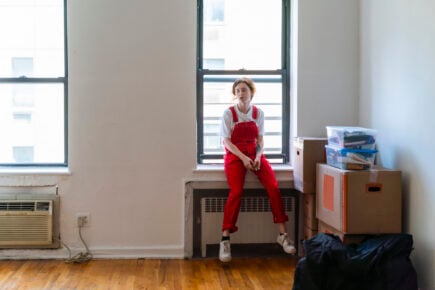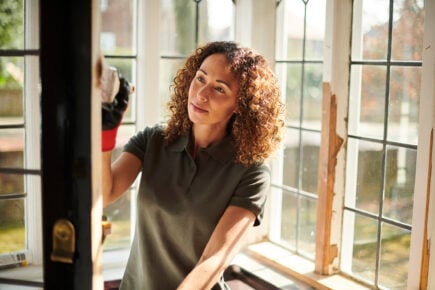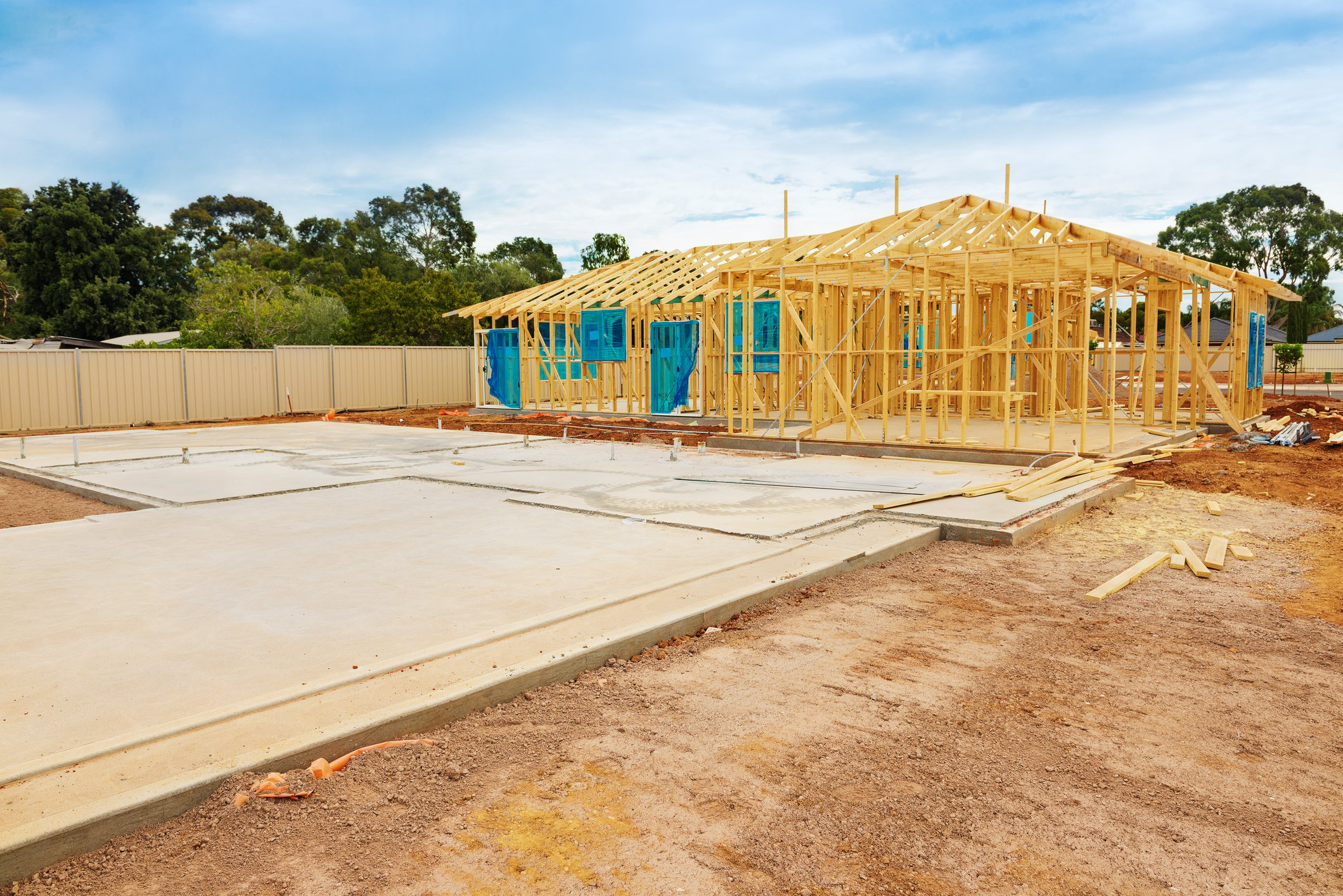Properties in Australia are usually sold by auction or private treaty, where prospective buyers inspect a property first. Buying ‘off the plan,’ on the other hand, means purchasing a property that has not yet been built, so buyers base their decisions on designs and plans.
When you buy off the plan, you may be able to inspect a demonstration or display home that mirrors the aesthetic style of the property being built.
What is an ‘off the plan’ property?
Apartments, townhouses and houses can all be ‘off the plan’ properties, where developers provide detailed plans to prospective buyers to show what the finished product will look like.
In some cases, buyers may be able to make special requests or choose from options to tailor the design and architecture to their liking.
This differs from traditional property sales by auction or private treaty, which involve selling a property to a buyer who can view the property in its current state. Buying off the plan also differs from buying land and building your own property, where you would have complete control and responsibility over the construction process.
How does buying off the plan work?
Typically, developers or real estate agencies acquire land and then plan and design a project. They then market and advertise these future properties to potential buyers.
Ideally, those developers provide potential buyers extensive information on what they are buying. Specifics may include:
- the size of the property
- floor plan
- interior design and architecture
- any optional decisions, like the number of bedrooms and bathrooms.
Buyers then pay a deposit to secure the property. Usually, a 20% deposit of the total property value is required to avoid paying lenders mortgage insurance.
However, with off-the-plan properties, you may only pay 5-10% as a deposit. The remaining portion of the deposit may be split into instalments paid at milestones in the property’s construction or paid at the end of the project.
The settlement period can take up to two years (or more), depending on the size and scale of the development. Your developer will provide you with an estimated timeframe for settlement. However, this can change throughout the process due to variables such as:
- council requirements
- weather
- availability of building materials
- suitable tradespeople.
Throughout the building process, the developer should provide you with updates and possibly opportunities to visit the building site. You’ll ultimately be handed the keys on settlement day, which generally occurs 14 days after you receive notice that the property was officially registered.
» MORE: Costs to know when buying a house
How does owning an ‘off the plan’ property work?
Like with any property purchase, you will need to research various lenders and ways to service your home loan. Your lender may offer conditional pre-approval, which means they are willing to loan you the money, but you will not be able to access this money prior to settlement.
When the property has been built, the lender will perform a valuation and re-evaluate your financial position.
It may also be beneficial to have a surveyor or conveyancer go over your contracts to understand:
- What happens to your deposit if the project is delayed or not finished?
- Who takes responsibility for any defects in the finished property?
- How much of a deposit is required when you sign the contract?
- How much is to be paid on completion of the property?
Once you reach the settlement date and the lender has valued the finished property, they will provide the funds to the developer and you start paying mortgage repayments the same way as you would with any property purchase.
» MORE: 10 questions to ask your mortgage lender
Potential benefits of buying off the plan
- May have a lower cost. If you get in early, you may be able to secure a lower purchase price as developers offer discounted prices to attract buyers at the start of the process.
- Government grants and schemes. Most states and territories offer first home buyer schemes for newly built properties. You may also qualify for stamp duty exemptions or grants when buying off the plan.
- Possibility of appreciation. Over a long construction process, the value of your property may rise due to market conditions. For example, a $350,000 off-the-plan purchase could be worth $400,000 on the day you actually move in due to a number of factors. This also means a lower LVR on your property.
- A smaller deposit may accepted. Because of the contract structure, you can secure the property for a 5-10% deposit. This means you can gain a foothold in the property market sooner and save more throughout construction.
- Tailored designs. Depending on the developer, you may be able to influence design options such as the floor plan and number of bedrooms.
Possible risks of buying off the plan
- Development could be stalled or cancelled. Many variables could come into play during the course of a long construction period, such as material and labour shortages or economic factors. These hiccups could mean your project is delayed or even cancelled. Additionally, if the developer goes bankrupt, you may lose your deposit or have it tied up for a long time, which can cause you financial stress.
- Complications if your circumstances change. Your financial situation can also change during the construction period. You may, for example, lose your job or face a reduction in the hours you can work for health reasons, but you will still be contractually obligated to pay off your mortgage when the construction is completed.
- Potential for depreciation. It’s also possible that the property will be worth less when it’s finished than what you paid for it. Market conditions, the quality of the construction and oversupply can all influence the property’s value, positively or negatively.
» MORE: What is mortgage stress?
How to reduce risk when buying off the plan
If you decide to buy off the plan, due diligence can help alleviate some risks. Including a sunset clause can help protect you if the developer does not finish building the property. You’ll also get your deposit back. However, you should also read up on how developers can take advantage of sunset clauses.
Each state and territory also has legislation to protect buyers from unfinished projects. Be sure to carefully read what consumer protection exists in your region and talk to a lawyer with experience in such matters if you’re at all unsure.
When buying off the plan, be sure to research the developer to determine whether they have a track record of completing projects. Scams may exist to take deposits from prospective buyers. If you are scammed, the Australian Competition and Consumer Commission is a good starting point for understanding how to recoup your losses before engaging legal representation.
DIVE EVEN DEEPER

Renting vs Buying in Australia: Which Is Best?
If deciding between renting vs buying in Australia, the best option weighs up the state of the market and your financial circumstances.

First Home Buyer Tips: 5 Mistakes To Avoid
Enlisting early help from a lending professional, doing neighbourhood-level research, and factoring ongoing costs into your budget are some key tips for first-time home buyers to consider.

10 Questions To Ask Your Mortgage Broker
A mortgage broker can be a great asset whether you’re a first-time home buyer, looking for an investment property or are thinking about refinancing your existing mortgage. Make sure they’re a good fit for you by asking the right questions.

What Is Capitalised Interest?
Interest is the cost a lender charges you when you borrow money. If you struggle to meet your repayments, you may be at risk of paying capitalised interest.

